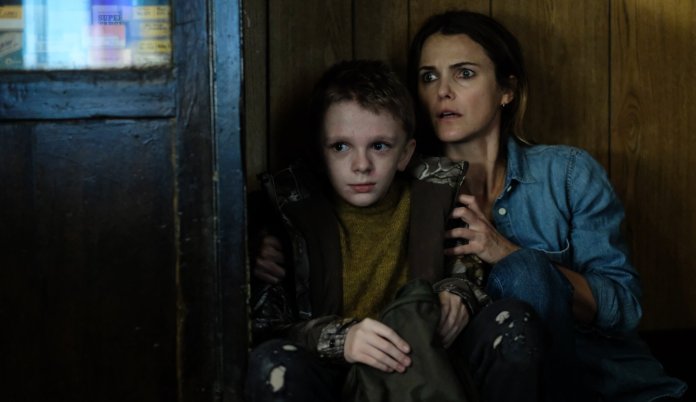No-one ever said that horror has to be fun. Some of the best horrors are fun, of course, but they don’t have to be. Sometimes they need to be, well … horrible. Gruelling. Relentless. Sometimes that’s just the story you need to tell. But if you’re going to put your audience through the ringer like that, if you’re going to trigger their trauma while serving their nightmares back to them, it’s got to be worth the journey. You need texture, dexterity, layers. Hereditary pulled it off, so did The Mist, The Witch, The Babadook and A Field In England. Scott Cooper’s Antlers, alas, doesn’t quite make the grade.
We open on a remote, autumnal mining town in Oregon, its pit long closed, its working men reduced to cooking meth, its leaves turning brown. Everyone, literally everyone, is miserable. The headteacher of the school is miserable, the pupils are miserable, the local police are miserable, the meth cooks are miserable. It’s not a happy place. Recovering alcoholic Julia Meadows (Keri Russell) has returned from self-imposed exile in California to teach at the local school and be with her brother (Jesse Plemons) now that their abusive father has died, and she is especially miserable. An abuse survivor herself, she becomes concerned for a boy in her class, Lucas (Jeremy T. Thomas), a starved and exhausted kid who seems even more miserable than everyone else. He has good reason to be. The mystery that follows leads to a particularly nasty horned beastie, ripped from Native American myth. We don’t know if that beastie is miserable, but it’s certainly not especially chipper.
If you can get past the bleak, bleak tone then there’s actually a lot to appreciate here. The framing is never less than beautiful and the cast are uniformly excellent – especially newcomer Thomas, who portrays this hungry, sunken yet resolute child superbly. Both Russell and Plemons wear their misery well, too: we buy into Julia’s damage and terror, and the pair’s quiet, uncertain bond tells its own effective and unspoken story. The visual horror elements here are also largely well done – the monster itself nods to the warped fairytale designs of producer Guillermo del Toro and the ashes and cinders that float on the air whenever it’s around are especially creepy. Cooper packs in some solid scares, both of the ‘jump’ and ‘slow-burn’ kind, and there are some nicely queasy visuals – at their most effective when they lean into body horror. The bleak tone is suffocating, but it’s also skillfully established. It’s not easy to be this sullen. Finally, there’s a neat trick deployed occasionally and effectively, where scenes involving Russell’s Julia jump-cut at odd points as the character dissociates from her surroundings. It’s subtly done and extremely unsettling; highlighting the disjointed, fractured headspace of an abuse survivor.
And yet, Antlers never really feels satisfying. There’s some genuinely special talent involved here – del Toro is joined on production duties by David S. Goyer, currently show-running Apple TV+’s excellent Foundation and gearing up to work on Neil Gaiman’s Sandman adaptation; the screenplay is based on a short story by Nick Antosca, who recently delivered Netflix’s brilliantly WTF horror surprise Brand New Cherry Flavour, and Cooper himself is no slouch – he gets a lifetime pass for Crazy Heart alone. Alas, the film is always less than the sum of its parts. There’s a lot of filmmaking skill on show, but those disparate elements never seem to marry properly. It’s as if Cooper and co are relying on that consistent tone of misery to smooth over the joins.
You’ll have seen all of this before: myths are ways to pass on warnings from history, humanity’s innate arrogance and cruelty is its own punishment, abuse is cyclical and systemic and the real monster is man himself. They’re worthy themes, but we’re rather beaten around the head by them. Cooper tries his hardest to channel these ideas into an effective monster movie, but the two sides never really gel. The human trauma is well told, but the supernatural manifestations feel half cooked and unexplored. The Native American myth that provides the story with its horror peg remains frustratingly, perhaps even offensively vague – a handy cultural meme taken off the peg to generate some spooky chills and work as a clumsy metaphor. Its lore is never properly locked in and, worse, neither is its spiritual heritage.
There’s no harm in misery and bleakness in a horror movie, but you need something of real substance if you’re going to ask an audience to push through it. Some sense of connection, a lightness of touch, room to breathe, in which the more harrowing aspects can be explored – all elements that mark the best work by, for example, Guillermo del Toro, but oddly absent here. Antlers takes a big thematic swing, but that swing never connects. Instead we have one sustained note; a kind of visual drone – it takes a worthwhile premise and renders it rootlessly depressing, occasionally traumatic and, worst of all, actually quite boring.









